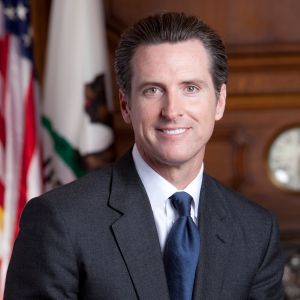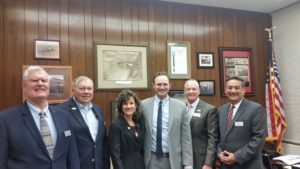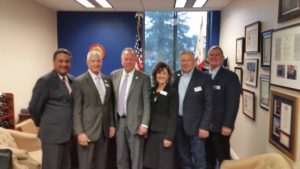Governor Releases 2019-20 Budget Proposal
 Governor Newsom released his first budget proposal on January 10, 2019. The budget assumes moderate growth over the three year period, but notes that even a mild recession could result in a $70 billion revenue loss and a $40 billion deficit over 3 years. The budget assumes a $1.8 billion transfer in the budget year and a $4.1 billion transfer over the remaining forecast period into the Rainy Day Fund, bringing the fund total to almost $20 billion.
Governor Newsom released his first budget proposal on January 10, 2019. The budget assumes moderate growth over the three year period, but notes that even a mild recession could result in a $70 billion revenue loss and a $40 billion deficit over 3 years. The budget assumes a $1.8 billion transfer in the budget year and a $4.1 billion transfer over the remaining forecast period into the Rainy Day Fund, bringing the fund total to almost $20 billion.
State Budget Overview
Significant Budget Growth. Under the Governor’s proposal, the overall state budget would increase by $7.7 billion (3.8%) from the enacted 2018-19 budget, to $209.1 billion. General Fund spending would increase by $5.5 billion (4.0%), to $144.2 billion.
Continued Growth in Long-Term Forecast. The administration expects continued growth in the three largest General Fund revenues – personal income tax, sales and use tax, and corporation tax. The forecast assumes annual growth in these three revenues combined will average 3% over the forecast period (through 2021-22). The administration assumes property tax revenues, estimated to increase 6% and 6.8% in the current and budget years, respectively, will continue growing steadily. The Governor acknowledges rising risks, however, most notably from the state General Fund’s heavy reliance on income from capital gains and on taxes paid by the top 1% of income earners.
Focus on Budget Resiliency. The proposed budget makes substantial commitments to reduce state debt, builds reserves, and allocates a large majority (87%) of discretionary spending in 2019-20 to one-time initiatives. Specifically, the budget would:
- Pay down pension liabilities. Includes $3 billion General Fund toward the state’s share of the California Public Employees’ Retirement System (CalPERS) unfunded liability and $1.1 billion from Proposition 2 debt payments towards the state’s share of the California State Teachers’ Retirement System (CalSTRS) unfunded liability for school and community college employees. Also includes $2.3 billion General Fund toward districts’ share of the CalSTRS unfunded liability for school and community college employees and $700 million to subsidize the 2019-20 and 2020-21 employer contributions.
- Pay off all remaining budgetary debt and deferrals ($4.4 billion).
- Increase the Rainy Day Fund (which has been accumulated from funds that do not count towards the state’s obligation to schools and community colleges) from $13.5 billion at the start of 2019-20 to $15.3 billion at the end of the fiscal year and $19.4 billion by the end of 2022-23.
- Increase the Safety Net Reserve to $900 million.
Major Initiatives. Many of the Governor’s proposals would address longstanding challenges college students face in their lives and communities, from food and housing insecurity to access to affordable child care and health care. Major proposals, by program area, would:
Education and Workforce
- Expand kindergarten and pre-kindergarten availability, expand child care facilities, and support workforce education ($1.25 billion one time) and add 10,000 preschool slots ($125 million ongoing).
- Augment funding significantly for University of California (UC) and California State University (CSU) operations, enrollment growth, student success, students’ basic needs, and deferred maintenance ($540 million ongoing and $417 million one time). Extension program funding is to expand degree and certificate completion programs for adults.
- Increase college affordability by expanding the California College Promise to a second year of tuition-free college for first-time, full-time CCC students; creating a supplemental award for Cal Grant recipients who are parents; and increasing the number of competitive Cal Grants ($171 million ongoing).
- Expand workforce training for mental health workers ($50 million one time through the Office of Statewide Health Planning and Development), and fund job training and apprenticeship opportunities focused on disadvantaged communities ($27 million annually for five years from the Greenhouse Gas Reduction Fund).
Health and Human Services
- Increase CalWORKs grant payments by 13.1$ ($348 million ongoing).
- Extend Medi-Cal eligibility to young adults ages 19 to 25 regardless of immigration status ($134 million ongoing) and centralize drug price negotiations for Medi-Cal.
- Reinstate an individual mandate to maintain health insurance and use proceeds to expand Covered California health insurance subsidies.
- Seek federal authorization to develop a single payer program.
Family and Worker Benefits
- Expand the state’s Earned Income Tax Credit and rename it the Working Families Tax Credit ($600 million ongoing, to be offset by conforming to federal tax law changes mainly impacting business income).
- Extend paid family leave from six weeks to eventually six months between two care givers, for each child.
Affordable Housing and Homelessness Services
- Promote housing development through additional cash grants, loans, and state tax credits ($1.3 billion one time).
- Support local government efforts to address homelessness ($500 million one time).
California Community Colleges Budget Overview
The administration’s budget summary totals all support for CCC including federal, state, and local funding, to $16.3 billion. (Local revenues include local property taxes as well as income from various fees and sales activities of colleges and districts.) The majority of funding for community colleges and districts – nearly all of the funding controlled by the state – falls under Proposition 98, a state constitutional amendment approved by the voters in 1988. Proposition 98 established a process for determining annual school and community college funding to be supported by a combination of local property tax and state General Fund dollars. Both the Legislative Analyst’s Office (LAO) and the Department of Finance (DOF) (to the extent its forecasts are available) project modest growth for Proposition 98 in the next few years.
Changes in Funding
The Governor proposes $272 million in ongoing policy adjustments for CCC, as reflected in the table below. The bulk of new funding ($262 million) is for 3.46% cost-of-living adjustments (COLA) for apportionments and certain categorical programs. The budget funds the Strong Workforce program at current levels, though it funds part of the program ($77 million) with settle-up and reappropriated funds, which are one-time funds, in 2019-20. The administration has committed to continuing to fund the program at this level in 2020-21. This commitment assumes that sufficient ongoing Proposition 98 resources will be available at that time. The Governor proposes to make permanent a 2018-19 one-time appropriation to fund a contract with nonprofit legal services organizations to provide immigrant legal services for eligible students.
| 2018-19 REVISED BUDGET a | $8,484 |
| Technical Adjustments | |
| Student Centered Funding Formula base adjustments | $112 |
| Remove one-time spending | -110 |
| Other technical adjustments | -26 |
| Subtotal | -$26 |
| Policy Adjustments | |
| Provide 3.46% cost-of-living adjustments (COLA) for Student Centered Funding Formula | $248 |
| Use settle-up and reappropriation funds for CCC Strong Workforce program | -77 |
| Expand California College Promise (AB 19) | 40 |
| Fund 0.55% enrollment growth | 26 |
| Provide 3.46 % COLA for certain categorical programs b | 14 |
| Adjust Student Success Completion Grant funding for workload | 11 |
| Make legal services to undocumented immigrants ongoing | 10 |
| Subtotal | $272 c |
| Total Changes | $246 |
| 2019-20 PROPOSED BUDGET a | $8,729 |
a Amounts exclude Adult Education Program and K-12 Strong Workforce Program funding.
b Applies to CalWORKSs, Campus Childcare, DSPS, EOPS, apprenticeships, and Mandates Block Grant programs.
c Administration’s $402 million total policy change reflects this amount plus funding formula base adjustments (above, technical) and $198 million in Adult Education COLA not shown here.
Expansion of College Promise
Additional Funding. The Governor proposes $40 million in new funding to expand the California College Promise (Assembly Bill 19 of 2017). The additional funds are estimated to be the amount needed to cover students’ second year of attendance.
Implementation of Student Centered Funding Formula
Implementation Using 2018-19 Rates, Adjusted for COLA, in 2019-20. The Governor’s budget proposal continues the Student Centered Funding Formula but adjusts the implementation provisions, pending further data analysis. Specifically, funding rates for 2019-20 would not shift to 65% for the base allocation and 15% for the student success allocation, but would instead reflect the 2018-19 rates plus a COLA. (The funding rates for 2020-21 and beyond would remain unchanged from current law.) As under current law, in 2019-20, a district would receive the highest of the following calculations: (1) the amount calculated pursuant to the Student Centered Funding Formula for 2019-20, (2) the amount calculated pursuant to the Student Centered Funding Formula for 2018-19, or (3) the amount the district received in 2017-18, adjusted by the COLAs in 2018-19 and 2019-20. The Chancellor’s Office would work with the advisory workgroup on Fiscal Affairs to determine how these changes would get implemented.
Additional Changes. The proposed budget limits year-to-year growth in the total amount of funds calculated for the student success allocation to 10%. In addition, proposed trailer bill language would modify the definition of the number of students who transfer to four-year universities.
Capital Outlay
The Governor’s budget proposal provides $358.7 million in capital outlay funding from Proposition 51, approved by voters in 2016. The funding is to support 15 continuing projects and 12 new projects. The Woodland Community College Performing Arts/Culinary capital project was not included in the list of new projects to be funded. The DOF reports that proposals were funded only if they clearly demonstrated that existing facilities do not meet programmatic needs and the projects represented critical needs (i.e., responding to fire, life, and safety concerns). Further, DOF indicated an expectation that districts provide a reasonable match using local funds. Advocacy efforts are ongoing to ensure this long awaited capital project is included in the 2019-20 budget.
YCCD Meets with Legislators at the Capitol
As part of the Community College League of California’s Annual Legislative Conference, Chancellor Houston traveled with YCCD trustees to the State Capitol to meet with local legislators.
 On Monday, January 28, 2019 the team met with Senator Bill Dodd, Senator Jim Nielsen, Senator Mike McGuire, Assemblymember James Gallagher, and Assemblymember Cecilia Aguiar-Curry. The attendees were armed with a set of talking points that included a response to portions of the Governor’s January Budget Proposal and recent legislation, including a letter addressed to the Department of Finance advocating for the funding of the Woodland Community College Performing Arts/Culinary capital project.
On Monday, January 28, 2019 the team met with Senator Bill Dodd, Senator Jim Nielsen, Senator Mike McGuire, Assemblymember James Gallagher, and Assemblymember Cecilia Aguiar-Curry. The attendees were armed with a set of talking points that included a response to portions of the Governor’s January Budget Proposal and recent legislation, including a letter addressed to the Department of Finance advocating for the funding of the Woodland Community College Performing Arts/Culinary capital project.
The talking points included:
No New Initiatives
The Yuba Community College District is thankful that the Governor has chosen not to make any major initiatives for community college as part of his 2019-20 budget proposal. The last few years, community colleges have undertaken major initiatives, such as Strong Workforce, Adult Education, Guided Pathways, Online College and a new funding formula. It is important that community colleges have some “breathing room” to make sure that these initiatives are implemented correctly prior to another major proposal.
2-Year Free Community College – College Promise
The Yuba Community College District supports the proposal to add a second year of fee-free community college for full-time (12 units or more) enrollees. Current Legislation, AB 2, would enact this priority, additionally, the Governor has proposed a second year of funding for the Community College Promise in his January budget proposal.
We have concerns, however, with the requirement that colleges participate in the federal loan program in order to receive funding under the initiative. We have concerns over the amount of debt that students are incurring as they access community college. Additionally, we are concerned that by entering the federal loan program, we are putting federal financial aid at risk for all our students due to default rates.
Funding Formula – Promise Grant (BOG Fee Waiver) Duplication for Multi-College Districts
Under the current formula, the number of Promise Grants (formerly Board of Governors Fee Waiver) are counted by district and not by college. This disadvantages multi-college districts as many multi-college districts have students that attend more than one college within the district. There is no difference in the level of services that need to be provided by a college of a different, nearby district, than if the college is located in the same district as the student’s primary college.
The funding formula should recognize that there are services for low income students that need to be accessed at the campus level regardless as to whether that college is in the same district or a different district from the student’s primary campus. This proposal would count Promise Grant students by college, not district, thus acknowledging the additional services that low-income students need at all colleges that they attend.
Support $3 billion in Funding for Lower Employer Contributions to CalSTRS
Yuba Community College District supports the Governor’s proposal to put $700 million into the CalSTRS system in order to “buy down” the employer contribution to the system by approximately one percent in 2019-20 and 2020-21. Over the last few years fixed costs, including rising retirement costs have crowded out funding that could go towards the classroom. The Governor’s proposal would save the Yuba Community College District $524,360 in 2019-20 and $380, 808 in 2020-21.
Support $1.5 Million for Teacher Credentialing Partnership Program
Last year, the Legislature passed and the Governor signed SB 577 (Dodd) which establishes a partnership program for community college districts to work with four-year teacher credential-granting institutions to expand access to teacher credentialing programs. The measure called for an investment of $1.5 million to fund up to three partnerships to address the shortage of credentialed teachers in needs areas. This is a small investment that could make a significant difference in some of California’s neediest areas.
Increased Financial Aid for Community College Students
Yuba Community College District supports the increased financial aid to community college students. The state budgets the lowest funding, on a per-student basis, to the community colleges, and existing policy makes relatively few resources available to students to support the total cost of attendance. A recent TICAS student found that in many areas of the state it is actually more expensive, when the total cost of attendance is taken into account, for a student to go to a community college than to the nearby CSU or UC campus. The new community college grant would take into account a student’s total cost of attendance and provide needed aid so that students can reduce their debt load and hours worked and increase student success.
Removal of Sunset Date on CCAP Dual Enrollment Program
Yuba Community College District supports the removal of the sunset date on the CCAP dual enrollment program created by AB 288 (Holden) in 2015. The provisions of law allows for community college to better outreach with local high schools to prepare students for college-going. These partnerships have enabled high school students to access community college courses early and set them on a path to move directly from high school to college, increasing their retention and success. The CCAP program has proven successful in many areas and it is time to make its provisions permanent. Assemblyman Holden has introduced bill, AB 30, which would streamline some of the dual enrollment provisions and remove the statute’s sunset date.
Removal of Sunset on Design-Build Statute
The Design-Build project delivery method for capital projects has proven to be very successful for community college districts. While community colleges were one of the first entities to be provided with the authority, the process is widespread throughout California’s public entities now. It has shown to decrease the time to completion and lessen change orders on projects. The authority expires at the end of this year and we support either making the authority permanent or extending the sunset.
Inclusion of the Yuba Community College District Facility on Approved Project List
The Board of Governors approved 39 new capital projects for community colleges in September 2018 in four separate categories (Health & Safety, Growth, Modernization, and Complete Campus). The Governor included only 12 of the BOG approved capital projects in his January budget proposal. The Chancellor and trustees met with the Department of Finance and provided a letter advocating for the WCC Performing Arts/Culinary capital project. A follow-up letter, to be signed by bi-partisan representatives, will be sent to the Governor for further advocacy of this capital project with the intent of ensuring the project is included in the May Revise.
District Newsletter
The District Newsletter is intended to share updates from various participatory District-wide decision-making groups, Board Policies and Administrative Procedures, updates from Cabinet, District Services, Fiscal Services, Information Technology, M&O, and Human Resources. The December 2018 District Newsletter is available here: February 4, 2019 District Newsletter
Chancellor Presents to Local Community on Wildfire Preparation
On January 24, 2019 the Oakmont Fire Safety Committee brought together a panel of presenter’s to discuss the creation and maintenance of safety zones around properties and neighborhoods. Chancellor Houston was one of four panelists that addressed the Council. Oakmont Village is an adult retirement community located in Sonoma County. Sonoma County experienced a destructive wildfire in the fall of 2017, the Tubbs Fire, devastating parts of Napa, Sonoma, and Lake Counties and affecting the city of Santa Rosa the most.
Chancellor Houston spoke about his experience saving his property, and others, during the November 2018 Camp Fire, by creating a defensible space over a period of years around his home in Paradise. Other presenters included Mr. Jeff Kunde, who shared his experience in creating a firebreak by bulldozing his property’s perimeter during the Tubbs Fire; Supervisor Gorin, who lost her home in the October 2018 wildfire, gave an update on the county’s plans and actions; and Oakmont resident, Mr. David Dearden, discussed grants submitted by the Oakmont Village Association to Cal Fire programs and what their residents might expect if awarded monies for fire safety.
State Chancellor’s Office Welcomes New Leadership
Chancellor Eloy Oakley announced new system office leadership in January:
 Sheneui Weber, former chief operating officer for advancement and economic development for the Long Beach Community College District, has been appointed vice chancellor of workforce and economic development. Ms. Weber brings many years of workforce development experience and expertise to the team, and will help solidify the implementation of the Strong Workforce initiative. After more than 7 years of dedicated service to the Chancellor’s Office, Van Ton-Quinlivan stepped down as Executive Vice Chancellor effective February 1 to pursue opportunities to teach at Stanford University.
Sheneui Weber, former chief operating officer for advancement and economic development for the Long Beach Community College District, has been appointed vice chancellor of workforce and economic development. Ms. Weber brings many years of workforce development experience and expertise to the team, and will help solidify the implementation of the Strong Workforce initiative. After more than 7 years of dedicated service to the Chancellor’s Office, Van Ton-Quinlivan stepped down as Executive Vice Chancellor effective February 1 to pursue opportunities to teach at Stanford University.
During Weber’s tenure with the Long Beach Community College District, she was responsible for the district’s economic and workforce development programs, strategy, operations and building public-private partnerships. She launched the Innovation Fund SoCal in partnership with the Ewing Marion Kauffman Foundation, the College’s first Entrepreneur-in-Residence program and the Goldman Sachs 10,000 Small Businesses program funded by the Goldman Sachs Foundation, among others.
Prior to Long Beach Community College District, Weber worked at California State University, Long Beach where she developed a unique training consortium of aerospace companies, known as Software Engineering Forum for Training, which provided tailored training for process improvement and management practices for software engineers. Weber earned a master’s degree in telecommunication and film from San Diego State University and a bachelor’s degree in business administration from Pacific Union College.
Online College District Board Appoints CEO
 In an announcement released by the State Chancellor’s Office, the California Online Community College Board of Trustees voted on February 6, 2019 to appoint the new CEO of the Online College District. The Board of Trustees confirmed Ms. Health Hiles as CEO and President of the California Online Community College District. Her contract was approved in a public vote of 9 in favor and one abstention by Trustee Man Phan, a business professor at Consumnes River College in Sacramento. Phan is a member of the community college systems’ board of governors and also a trustee of the board that oversee the online community college.
In an announcement released by the State Chancellor’s Office, the California Online Community College Board of Trustees voted on February 6, 2019 to appoint the new CEO of the Online College District. The Board of Trustees confirmed Ms. Health Hiles as CEO and President of the California Online Community College District. Her contract was approved in a public vote of 9 in favor and one abstention by Trustee Man Phan, a business professor at Consumnes River College in Sacramento. Phan is a member of the community college systems’ board of governors and also a trustee of the board that oversee the online community college.
The release described Ms. Hiles as an “innovator, education leader, and successful entrepreneur with a deep commitment to equity in education and creating economic opportunities for underserved people.” She has spent the last 30 years helping people succeed academically and economically. According to the release, the Online College Board of Trustees was seeking a visionary leader “who deeply understands not just education but also how to launch, grow, and run a new technology and social impact venture.”
Ms. Hiles is the founder of Pathbrite – the world’s leading portfolio learning platform – and recently served as Deputy Director of Postsecondary Success at the Bill & Melinda Gates Foundation, where she invested more than $100 million to promote student success in higher education and workforce readiness for new economy jobs. Earlier in her career, Hiles founded and built SF Works, training and placing more than 11,000 women from welfare into living wage jobs and co-founded EARN, which has helped more than 30,000 low income San Franciscans acquire their first assets.
Student Centered Funding Formula Oversight Committee Appointed
The 2018-19 state budget established, with the Student Centered Funding Formula (SCFF), an SCFF Oversight Committee charged with reviewing and evaluating the implementation of the formula.
Specifically, the committee is charged with making recommendations to the Legislature and the Department of Finance—by January 1, 2020—regarding inclusion of measures (as part of the calculation of the SCFF supplemental allocation) related to first-generation college-going, financial need given differences in costs across regions, and academic proficiency of incoming students. The committee is also expected to review, by June 30, 2021, funding for noncredit instruction and instruction delivered pursuant to instructional service agreements, as well as the methods by which district allocations could be adjusted in a recession.
The committee consists of 12 members, with the Governor, the Speaker of the state Assembly, and the Senate Committee on Rules each appointing members. In describing the committee’s membership, the law calls for geographic balance and for diversity in socioeconomic background and professional experience. The members of the committee were recently appointed. They are:
- Sonya Christian, president of Bakersfield College.
- Bonnie Ann Dowd, executive vice chancellor of business and technology services at the San Diego Community College District.
- Ann-Marie Gabel, vice chancellor of business services at the South Orange County Community College District.
- Angélica Garcia, vice president of student services at Skyline College.
- Elizabeth Guillen, director of legislative and community affairs at Public Advocates.
- Valerie Johnson, student at Crafton Hills College and San Bernardino Valley College and president of the Crafton Hills College student senate.
- John McDowell, Jr., founder of the Labor Center at Los Angeles Trade Technical College.
- Kindred Murillo, superintendent and president of Southwestern College.
- Christopher Nellum, senior director for higher education at the Education Trust-West.
- Manuel Payan, grounds equipment operator at San Joaquin Delta College.
- Michele Siqueiros, president of the Campaign for College Opportunity.
- Dianne Van Hook, chancellor of College of the Canyons.
The Board of Governors recently approved a contract with WestEd for project management, technical advice, and administrative support for the committee. The Chancellor’s Office is working with WestEd to begin these activities as soon as possible. The Chancellor’s Office will also work with the Advisory Workgroup on Fiscal Affairs to align the workgroup’s efforts with the committee’s activities moving forward.
Legislative Update
Bills of Interest
- AB 211 (Calderon) – For taxable years beginning on or after January 1, 2019, would allow under that law a deduction against gross income in the amount equal to the monetary contribution made by a qualified taxpayer to the California qualified tuition program established pursuant to the Golden State Scholarshare Trust Act not to exceed either $5,000 or $10,000, as provided. The bill would require the Scholarshare Investment Board to report to the Legislature, on an annual basis, specified data related to this deduction and Scholarshare accounts.
- AB 232 (Cervantes) – a spot bill that would express the intent of the Legislature to enact legislation creating an articulation platform for the California Community Colleges to facilitate the transition of recent veterans to state institutions of higher education.
- AB 237 (Irwin) – a spot bill that would provide a nonsubstantive change to provisions of law that establish the Bureau for Private Postsecondary Education and provides for its functions and responsibilities.
- AB 239 (Salas) This bill would extend operation until January 1, 2025, of provisions that authorize a community college registered nursing program to use any diagnostic assessment tool that is commonly used in registered nursing programs and approved by the Chancellor of the California Community Colleges. Existing law authorizes a community college registered nursing program to use additional multicriteria screening measures, administered in accordance with specified requirements, if it determines that the number of applicants to that registered nursing program exceeds its capacity.
- AB 244 (Voepel) – a spot bill that would declare the intent of the Legislature to enact legislation that would increase awards under the Cal Grant Program from $10,000 to $15,000 annually.
- AB 249 (Choi) – this bill would prohibit a public employer from deterring or discouraging a public employee or an applicant to be a public employee from opting out of becoming or remaining a member of an employee organization. The bill would prohibit a public employer from taking adverse action against a public employee or applicant to be a public employee who opts out of becoming or remaining a member of an employee organization and would specify that adverse action includes reducing a public employee’s current level of pay or benefits.
- AB 260 (Quirk-Silva) – this bill would require a campus of the California Community Colleges or the California State University that issues student identification cards to include on the back of the student identification cards the telephone number for the National Suicide Prevention Lifeline, the Crisis Text Line, or a local crisis telephone number and text line, and specified law enforcement and security telephone number information. This bill would require the campuses, as specified, to also post this information on flyers in campus restrooms and gymnasiums.
- AB 302 (Berman) – this bill would require a community college campus that has parking facilities on campus to grant overnight access to those facilities to any homeless student who is enrolled in coursework, has paid enrollment fees, and is in good standing with the community college, and would require the governing board of the community college district to determine a plan of action to implement this requirement.
- AB 314 (Bonta) – this bill would prescribe requirements relating to release time that would apply to all of the public employers and employees subject to specific acts and would generally repeal the provisions relating to release time in those acts. The bill would require these public employers to grant a reasonable number of employee representatives of the exclusive representative reasonable time off without loss of compensation or other benefits for specified activities. This requirement would apply to activities to investigate and process grievances or otherwise enforce a collective bargaining agreement or memorandum of understanding; to meet and confer with the public employer on matters within the scope of representation, including preparation for the activities specified in these provisions; to testify or appear as the designated representative of the exclusive representative in conferences, hearings, or other proceedings before the Public Employment Relations Board or similar bodies; to testify or appear as the designated representative of the exclusive representative before the governing body of the public employer, or a personnel, civil service, or merit commission, among others, and to serve as a representative of the exclusive representative for new employee orientations. The bill would require the exclusive representative to provide reasonable notice requesting an absence in this connection. The bill would specify that its provisions prescribe minimum release time rights and would prescribe requirements regarding the relation of its provisions to other labor agreements that address release time.
- AB 353 (Stone) – this bill would eliminate the provisions of law that requires the Office of Privacy Protection in the Department of Consumer Affairs to establish a task force, to conduct a review of the use by all public and private colleges and universities in this state of social security numbers in order to recommend practices to minimize the collection, use, storage, and retention of social security numbers. Existing law requires the task force to submit a report of its findings and recommendations to the Office of Privacy Protection and to the Assembly Committee on Judiciary and the Senate Committee on Judiciary, on or before July 1, 2020.
- SB 150 (Beall) – this bill would authorize the Student Aid Commission to make initial award offers of Chafee Educational and Training Vouchers Program of up to 200% of total state and federal program funding available for all awards, with the number of initial awards offered and the amount of the award to be determined based on the historical rate of award acceptance. This bill would provide that if the acceptance rate of the awards offered exceeds the program funding available, the commission shall deduct the overage from the following year’s program funding allocation. This bill would also take away Chafee grant eligibility from a student who fails to demonstrate satisfactory academic progress, as defined by the institution where the student is enrolled, for 2 consecutive years, with specified exceptions. The bill would require that institutions provide an appeal process in writing and reinstate the student’s Chafee grant when certain conditions are met. The bill would also provide that a student who loses Chafee eligibility and subsequently is not enrolled for one or more terms shall regain eligibility upon reenrollment.
- SB 173 (Dodd) – this bill would require the State Department of Social Services to create a standardized form to be used by community colleges and universities to verify the workstudy eligibility of students who are approved and anticipate participating state and federal workstudy. The bill would require community colleges and universities to distribute the form to all students approved for state and federal workstudy and to provide information required to complete that form.
- ACR 14 (Limon) – would recognize the week of March 17, 2019, to March 23, 2019, inclusive, as Dual Enrollment Week in California and would encourage colleges and universities to visit high schools and take action to help pupils register in dual enrollment courses.
Chancellor’s Calendar

4 – Planning call with Humboldt State (prospects of partnership for Wildland Fire Education and Research program)
5 – Cabinet Planning Retreat
5 – Meeting with Trustee Ortiz
5 – District Consultation and Coordination Council (DC3)
6 – Facilities/Audit and Finance Committee meetings
6 – Meeting with Trustee Pasquale
6 – Foundation Board meeting
7 – District, Colleges, Academic Senates (DCAS) meeting
7 – Meeting with Student Trustees
7 – ACCCA Executive Board monthly conference call
8 – Foundation Director Interviews
11 – Meeting with Trustee Teagarden
12 – Foundation Director Interviews
13 – District Management Council
13 – WEDPAC/EDPAC (CCCCO Workforce and Economic Development Policy Advisory Committee) meeting
13 – Meeting with Senator Jim Nielsen
14 – YC Student Veterans Association Luncheon
14 – Meeting with Trustee Savarese
14 – Policy Committee meeting
14 – Meeting of the Governing Board
15 – Presidents’ Day Holiday (District Closed)
18 – Presidents’ Day Holiday (District Closed)
19 – Chancellor’s Cabinet
20 to 23 – ACCCA Annual Conference (Rancho Mirage)
26 – Chancellor’s Cabinet
27 & 28 – Foundation Director 2nd Interviews

